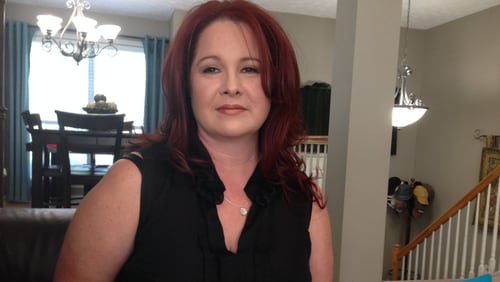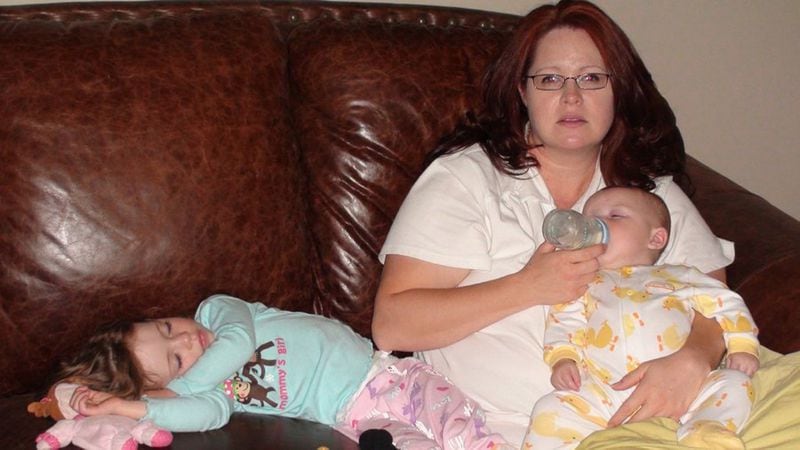The pregnancies were pretty easy except Amy Corn felt unusually anxious. About germs. About death.
The dark moments first surfaced in 2008 when Corn was pregnant with her daughter and again in 2011 while pregnant with her son. “There were days when I felt completely hopeless, and nervous, and cried for no reason,” Corn said recently.
For years, she accepted the dark mood as her new normal. Then in the summer of 2013, while vacationing in Florida, Corn stepped out on the balcony of their 19th-story hotel room and a thought so disturbing popped in her head, she rushed back inside. “If you jump, it probably won’t even hurt because there is sand down there,” a voice said to her.
As horrible as that was, it isn’t all that unusual. Corn was experiencing postpartum depression, considered the most common complication of childbirth.
In the United States, 1 in 7 new mothers report suffering from some type of perinatal mood disorder, which, if not properly treated, can have a long-term negative impact on the health of the entire family.
RELATED: 5 signs you should ask your doctor about depression
And according to the Mental Health America of Georgia website, more than 30,000 pregnant and postpartum women are likely to experience a perinatal mood disorder in this state alone. Think about that. Instead of enjoying one of the happiest times of your life, you’re feeling worthless, uninterested, depressed, suicidal or worse.
Consequently, women often feel alone in their suffering, believing the myth that motherhood and maternity leave should be the best times of their lives. First-time parents often have no experience with which to compare their new roles, creating a distorted perception of parenthood.
“Parents scroll through Facebook thinking everyone’s baby magically sleeps all day, mamas are all well rested, and the transition into parenthood is seamless,” said Elizabeth O’Brien, state coordinator of Postpartum Support International. “We know that this simply is untrue. Parenthood requires support during this normal but bumpy transition.”
After her daughter’s birth, Corn would just sit and stare at her. The magical world she’d imagine didn’t pan out. “I’d just look at her,” the 42-year-old Gainesville mother said. “I felt nothing.” Her doctor suggested she go talk to somebody. “I didn’t know who to call,” Corn remembered. “I didn’t know what a licensed professional counselor was. I didn’t know a psychiatrist from a psychologist. I let it go because I didn’t know what to do or who to contact. Looking back, I wish he had said let’s talk about that for a moment.”
When her son arrived three years later, Corn immediately bonded with him but within six months was living in the same dark place. “I became extremely hypervigilant, constantly on guard that something bad was going to happen,” she said. “I didn’t know how to make my brain shut off. Everything was horrible. There was no joy no matter what I did.”
Then she had that thought suggesting she jump from that balcony. Corn shared her fears with her husband, Jeff, but she still had no words for what she felt. When a friend told Corn over lunch weeks later that postpartum depression almost drove her to take a bottle of pills, Corn knew. “I had a name for the hell I was going through,” she said. “For the first time in years, I had hope. I knew I was going to get better.”
At home that day, Corn Googled postpartum depression and found page after page of information about the disorder and organization after organization to help. “The more I read, the more it occurred to me I wasn’t the only person feeling this,” she said.
But like many mothers, she couldn't afford a therapist. She Googled self-help for postpartum and again found a plethora of resources. Postpartum Progress. Postpartum Support International. Mental Health America of Georgia.
“No one had ever told me how common postpartum depression was,” she said. “I thought I’m a normal mom, and if this happened to me, I know it’s happening to other moms. If I can educate them, maybe they won’t suffer like I did and as long as I did.”
Helping others became Corn’s mission. She started by volunteering with Project Healthy Moms and recently joined the board of directors at Postpartum Support International’s Georgia chapter.
“Once I discovered how common perinatal mood and anxiety disorders were, I was shocked,” Corn said. “The good news is that these illnesses are treatable. There are so many amazing organizations out there helping moms, PSI Georgia chapter included.”
Last month, the PSI Georgia chapter launched a website — www.psiga.org — that links moms with information about therapists and support groups online and in person in their area. They also offer live and online training for professionals who work with pregnant women, new mothers and their families, including therapists, OB/GYNs, pediatricians, midwives, doulas.
“We want to get as many people as possible in Georgia trained in maternal mental health, so we can connect mothers with the resources they need,” Corn said.
Sometimes asking for help is the hardest thing we can do, but if you’ve had a baby and start to feel overwhelmed, anxious, depressed or angry, please talk to your doctor or another health provider in your area.
RESOURCES
Mental Health America of Georgia, www.mhageorgia.org
Postpartum Progress, www.postpartumprogress.com
Postpartum Support International, Georgia chapter, www.psiga.org
About the Author










